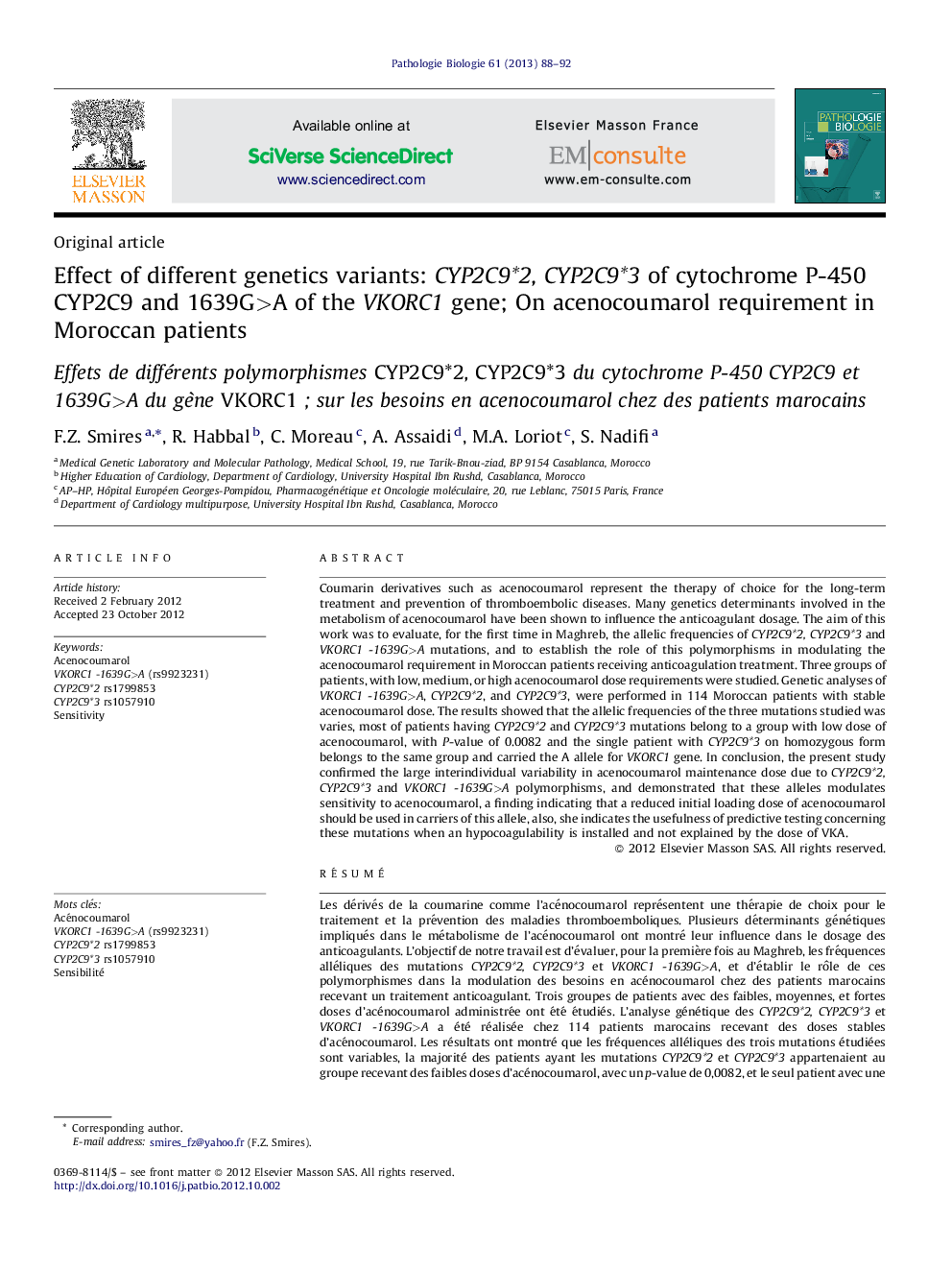| Article ID | Journal | Published Year | Pages | File Type |
|---|---|---|---|---|
| 6216342 | Pathologie Biologie | 2013 | 5 Pages |
Coumarin derivatives such as acenocoumarol represent the therapy of choice for the long-term treatment and prevention of thromboembolic diseases. Many genetics determinants involved in the metabolism of acenocoumarol have been shown to influence the anticoagulant dosage. The aim of this work was to evaluate, for the first time in Maghreb, the allelic frequencies of CYP2C9*2, CYP2C9*3 and VKORC1 -1639G>A mutations, and to establish the role of this polymorphisms in modulating the acenocoumarol requirement in Moroccan patients receiving anticoagulation treatment. Three groups of patients, with low, medium, or high acenocoumarol dose requirements were studied. Genetic analyses of VKORC1 -1639G>A, CYP2C9*2, and CYP2C9*3, were performed in 114 Moroccan patients with stable acenocoumarol dose. The results showed that the allelic frequencies of the three mutations studied was varies, most of patients having CYP2C9*2 and CYP2C9*3 mutations belong to a group with low dose of acenocoumarol, with P-value of 0.0082 and the single patient with CYP2C9*3 on homozygous form belongs to the same group and carried the A allele for VKORC1 gene. In conclusion, the present study confirmed the large interindividual variability in acenocoumarol maintenance dose due to CYP2C9*2, CYP2C9*3 and VKORC1 -1639G>A polymorphisms, and demonstrated that these alleles modulates sensitivity to acenocoumarol, a finding indicating that a reduced initial loading dose of acenocoumarol should be used in carriers of this allele, also, she indicates the usefulness of predictive testing concerning these mutations when an hypocoagulability is installed and not explained by the dose of VKA.
RésuméLes dérivés de la coumarine comme l'acénocoumarol représentent une thérapie de choix pour le traitement et la prévention des maladies thromboemboliques. Plusieurs déterminants génétiques impliqués dans le métabolisme de l'acénocoumarol ont montré leur influence dans le dosage des anticoagulants. L'objectif de notre travail est d'évaluer, pour la première fois au Maghreb, les fréquences alléliques des mutations CYP2C9*2, CYP2C9*3 et VKORC1 -1639G>A, et d'établir le rôle de ces polymorphismes dans la modulation des besoins en acénocoumarol chez des patients marocains recevant un traitement anticoagulant. Trois groupes de patients avec des faibles, moyennes, et fortes doses d'acénocoumarol administrée ont été étudiés. L'analyse génétique des CYP2C9*2, CYP2C9*3 et VKORC1 -1639G>A a été réalisée chez 114 patients marocains recevant des doses stables d'acénocoumarol. Les résultats ont montré que les fréquences alléliques des trois mutations étudiées sont variables, la majorité des patients ayant les mutations CYP2C9*2 et CYP2C9*3 appartenaient au groupe recevant des faibles doses d'acénocoumarol, avec un p-value de 0,0082, et le seul patient avec une mutation CYP2C9*3 sous forme homozygotes appartient au même groupe en ayant également l'allèle muté (A) du gène VKORC1. En conclusion, notre étude confirme la grande variabilité interindividuelle dans le maintien de la dose d'acénocoumarol due aux polymorphismes CYP2C9*2, CYP2C9*3 et VKORC1 -1639G>A. Elle démontre également que ces allèles modulent d'une manière importante la sensibilité à l'acénocoumarol. Ainsi, la dose d'acénocoumarol administrée doit être réduite chez les patients ayant ces allèles, d'où l'utilité d'un test génétique prédictif en état d'hypocoagulabilité installé et non expliqué par la dose d'AVK.
